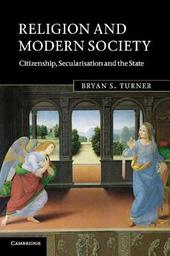
|
Religion and Modern Society: Citizenship, Secularisation and the State
Paperback / softback
Main Details
| Title |
Religion and Modern Society: Citizenship, Secularisation and the State
|
| Authors and Contributors |
By (author) Bryan S. Turner
|
| Physical Properties |
| Format:Paperback / softback | | Pages:374 | | Dimensions(mm): Height 228,Width 152 |
|
| ISBN/Barcode |
9780521675321
|
| Classifications | Dewey:306.6 |
|---|
| Audience | | Tertiary Education (US: College) | |
|---|
|
Publishing Details |
| Publisher |
Cambridge University Press
|
| Imprint |
Cambridge University Press
|
| Publication Date |
31 March 2011 |
| Publication Country |
United Kingdom
|
Description
Religion is now high on the public agenda, with recent events focusing the world's attention on Islam in particular. This book provides a unique historical and comparative analysis of the place of religion in the emergence of modern secular society. Bryan S. Turner considers the problems of multicultural, multi-faith societies and legal pluralism in terms of citizenship and the state, with special emphasis on the problems of defining religion and the sacred in the secularisation debate. He explores a range of issues central to current debates: the secularisation thesis itself, the communications revolution, the rise of youth spirituality, feminism, piety and religious revival. Religion and Modern Society contributes to political and ethical controversies through discussions of cosmopolitanism, religion and globalisation. It concludes with a pessimistic analysis of the erosion of the social in modern society and the inability of new religions to provide 'social repair'.
Author Biography
Bryan S. Turner is Presidential Professor of Sociology at the City University of New York Graduate School and Director of the Committee on Religion. He is a prominent figure in the field of the sociology of religion and editor of The Cambridge Dictionary of Sociology (2006).
Reviews'A distinguished display of theoretical sophistication and empirical richness that restores religion to its rightful position at the centre of sociological debates about modernity, globalization, multiculturalism, consumerism, cosmopolitanism and citizenship. Bryan Turner's highly readable book is full of original and provocative contributions towards a fresh understanding of religion and spirituality at the level of individuals, nations and global society.' James A. Beckford, University of Warwick 'Bryan Turner's intellectual breadth and his deep appreciation of religion as a global force converge in an insightful analysis of the many ways in which religion, politics, and everyday culture interpenetrate today.' Michele Dillon, Professor of Sociology, University of New Hampshire 'In advancing a comparative sociology of global religion, Bryan Turner produces a penetrating, if controversial, counterpoint to the common assumption that we are in a robustly, even violently, sacralised age. He clinically interrogates conventional assumptions and makes the compelling argument that a globalised market economy has encouraged both a sliding scale of church-state separation and commercialised social religion: not the 'revenge of God', but secularisation of an often unappealing kind. All who think, or worry, about the impact of religious affiliation on society and politics need to read this book.' James Piscatori, Durham University 'By placing globalization at the center of studies of religion, and religion at the center of contemporary social theorizing, Turner has produced a volume that will be widely read by scholars concerned about religion, globalization, and the social sciences more broadly. This volume would be ideal for graduate level social theory courses and those in the sociology of religion addressing central theoretical issues in the field.' Wendy Cadge, Contemporary Sociology: A Journal of Reviews '... this is a sophisticated take on a topic that has terrific importance in today's world.' George Soroka, Journal of Church and State 'It is a praiseworthy work that reminds sociologists to maintain a balance between specialized research subfields and the borders of interdisciplinary debate, between theoretical criticism and conceptual clarification, and between empirical richness and normative expectation. Thus, Religion and Modern Society is not only an endeavor of sociology of religion which moves beyond the secularization theme and the rational choice approach to religion; it is also an accomplishment that melds body studies, citizenship studies, social theory, and social research into a sociological intervention of both the public issues of religions and the humanity debate of post-secularity ... This book is highly recommended to researchers interested in sociology of religion, social theory, and humanity studies of religion.' Society
|